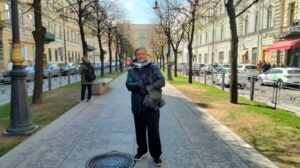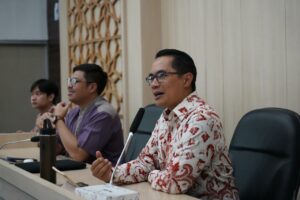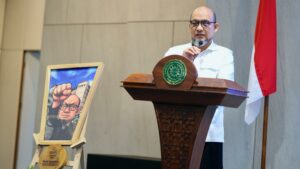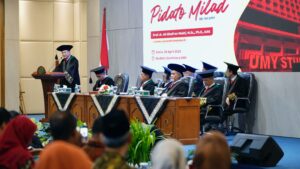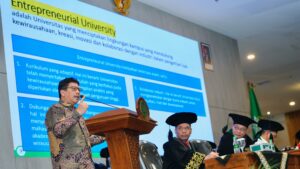Indonesian government has to concern with the development of border areas. 1,138 of 5,011 rural areas are located in border areas. Government ought to improve the system and lift public welfare in the border areas lest other countries may look down Indonesia.
The aforementioned paragraph was uttered by Vice Chancellor 1 of Universitas Muhammadiiyah Yogyakarta (UMY) Dr. Ir. Gunawan Budiyanto, M.P. acting as a keynote speaker in ‘Bincang Sebatik’. The event was conducted at Building A.R. Fachuddin A, Floor 5, UMY. Gunawan was also the person in charge of a program of Community Service (KKN) of Border Area for UMY’s students. He stated that several countries considered that border areas are a window maintaining prestige among border countries. “Each country concerns with developing border areas so that other countries will not put them down. The development of border areas can focus on infrastructures and public welfare. It aims at avoiding interference of other countries. Thus, Indonesia must develop the border areas so that other countries will not underestimate this country,” he argued.
Gunawan conveyed that a presidential decree (Pepres) No.2/2015 on National Mid-Term Development Plan (RPJM) is plans of ministries and governmental agencies for each area for five years. On the Perpres, it is mentioned national development strategies, general policies, programs of ministries/agencies as well as among the ministries/agencies, areas and inter-areas, and macroeconomic scaffoldings including entirely economic visualization like fiscal policy of work plans on indicative regulation and funding scaffolding. “Mid-term development plan is written on the Perpres, but a lot of border areas remain left behind in economic aspect and the welfare,” expressed Gunawan.
He inserted that issues of 3T (Disadvantaged, Outermost, Frontier) areas comprise are in fields of education, infrastructure, and public welfare. For instance, one of the educational issues is that the number of teachers is not equal to the number of students in border or 3T areas. The small number of teachers cannot accommodate the great number of students, so that the spread of teachers should be enhanced. “Education is the foremost factor to foster public welfare in border areas. Road infrastructure should be the concern as well because it is an access to public economic development,” he added.
Additionally, students of UMY successfully conducted Community Service (KKN) in Sebatik Island, Nunukan regency, for two months. The students carried out several programs like educational synergy, creative economy, and moral and intellectual-based young character empowerment. A supervisor of the KKN and one of the speakers of the seminar Ahmad Ma’ruf, S.E. said that the KKN in a border area can assist government to cope with social issues of the border area, particularly Sebatik Island. He expected that the KKN will be a sustainable program and it can be conducted in areas of 3T. “The KKN in border areas is a proper solution organized by students as their concern of this nation’s circumstances. Several programs of KKN will help government improve social condition in border areas,” he told.

